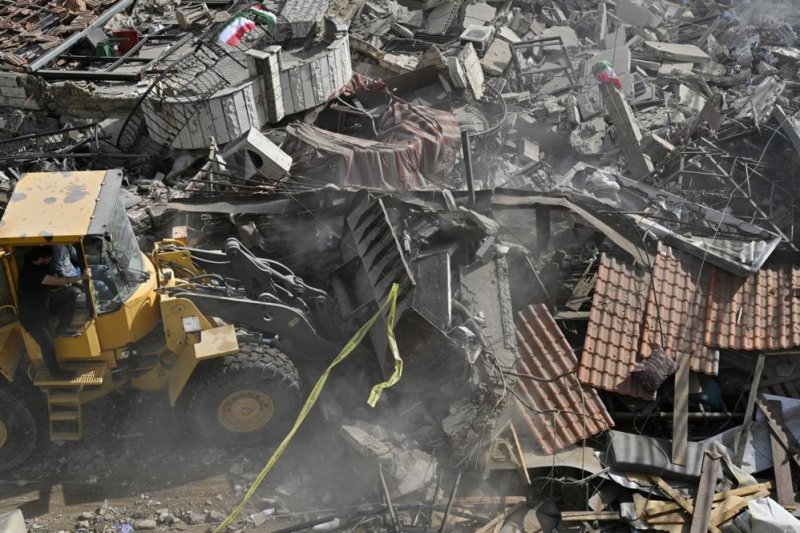Rescue workers search for victims in the rubble of a building after an Israeli airstrike in southern Beirut, Lebanon, on Friday. At least two missiles hit a building in the Hadath area, which was destroyed by the attack after an Israeli military warning earlier in the day, according to the Lebanese National News Agency. Photo by Wael Hamzeh/EPA-EFE
BEIRUT, Lebanon, March 28 (UPI) — Israel carried out an airstrike on Beirut’s southern suburbs Friday in a first such attack since the Nov. 27 cease-fire agreement that ended the war with Israel.
The strike targeted a building in a densely populated residential and commercial area in which two schools are nearby.
Residents and schoolchildren rushed to evacuate the area in panic, with cars clogging the streets, after Israeli Army spokesperson Avichay Adraee issued a warning and a map showing the targeted building in red.
The building was flattened by a direct hit, while massive plumes of smoke billowed from the site. No casualties were reported.
The Israeli Army said in a statement that it targeted a drone storage facility used by Hezbollah‘s aerial unit and warned that it will continue “to operate to remove any threat” to Israel.
This was the first such attack on Beirut since a U.S.-France brokered cease-fire accord was reached, ending 14 months of destructive war between Israel and Hezbollah.
The cease-fire went into effect Feb. 18 after Israel requested an extension. Although it pulled out its forces from south Lebanon on that day, Israel retained five strategic positions and continued to bomb Hezbollah suspected positions in the country’s southern and eastern regions.
Friday’s air and artillery strikes that also targeted several areas in southern Lebanon came in response to two rockets that were launched toward Kiryat Shmona and the surrounding area in northern Israel, one of which was intercepted, according to the Israeli Army.
The Lebanese Health Ministry said three people, including a woman, were killed and 18 others wounded in an Israeli strike on the village of Kfar Tibneet in southern Lebanon. The injured included six children and eight women.
A Hezbollah source denied any connection with the morning rockets launched into northern Israel and reiterated its commitment to the cease-fire agreement. The source quoted by the group’s Al Manar website said these incidents were part of “a suspicious” scheme to justify the continuation of the “Israeli aggression” against Lebanon.
The Lebanese army announced that the rocket launchers used in the morning attack against northern Israel were found near the village of Qaaqaait al-Jisr, north of the Litani River. The army said it started an investigation to determine who was behind the rocket fire and denounced the Israeli air strikes and “escalating aggressions” as a “blunt violation” of the cease-fire accord.
Lebanese Prime Minister Nawaf Salam denounced the Israeli attacks that target civilians and residential areas as “a dangerous escalation,” calling for stopping Israel’s continued violations of the cease-fire and securing its complete withdrawal from the five sites it still occupies in southern Lebanon as soon as possible.
French President Emmanuel Macron, who was meeting with Lebanese President Joseph Aoun in Paris, said the Israeli airstrikes were “unacceptable” and “a violation of the cease-fire.”
“The strikes are unilateral actions that betray a given promise and play into the hands of Hezbollah,” Macron said, adding that he would speak by phone with U.S. President Donald Trump “in the coming hours” and with Israeli Prime Minister Benjamin Netanyahu within two days regarding the new Israeli airstrikes on Lebanon.
Aoun condemned “any despicable attempt” to drag Lebanon into a spiral of violence.
Israeli Defense Minister Israel Katz warned that if the Lebanese government fails to enforce the cease-fire agreement with Hezbollah along the border, Israel will take action to do so itself, according to Israel’s Ynet English website.
“I am sending a clear message to the Lebanese government: If you do not enforce the ceasefire agreement, we will enforce it,” he said in a statement after Israeli aircraft hit targets in Beirut.
Katz’s warning came as Asaf Lengelben, head of the Upper Galilee Regional Council, said the morning’s rocket fire into Kiryat Shmona was the second in less than a week and “is proof that even as residents return to the north [of Israel], the security challenge is still here.”
“We will not agree to accept any kind of ‘drip fire,'” Lengelben said.
He was referring to some 60,000 Israelis who were displaced from northern Israel during the war with Hezbollah that started in support of Gaza in October 2023.
U.N. Special Coordinator for Lebanon Jeanine Hennis-Plasschaert warned in a statement that “a return to wider conflict” in Lebanon would be devastating for civilians on both sides and “must be avoided at all costs.”
More than 20,000 people have been killed or wounded in Lebanon since October 2023, though most of the casualties were reported following Israel ramping up its military operations starting Sept. 23.
Nearly 1.2 million people were displaced, mainly from the southern suburbs of Beirut, as well as from southern and eastern Lebanon, because of the intensive Israeli air and ground bombardments.
A great number of them could not return to their villages in southern Lebanon, especially along the border, because they were destroyed.
